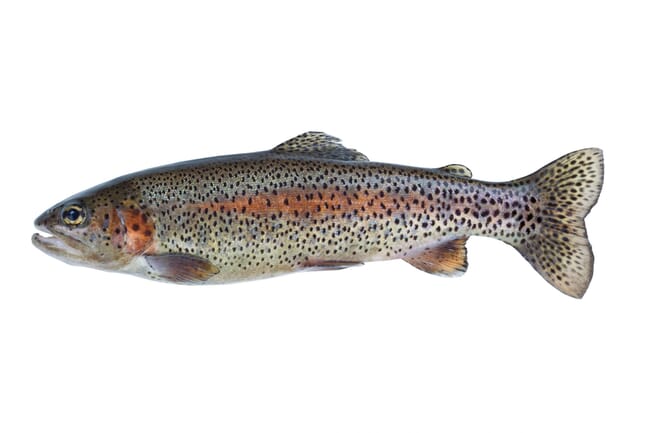
Cooke said it will now be forced to kill 332,000 juvenile steelhead that were planned to be stocked at the two sites during 2023. © Cooke Aquaculture
The decision to close down Cooke's steelhead farming operations in Washington was announced this week by the Department of Natural Resources (DNR). It gives the company until December 14 to finish operations and begin removing its facilities.
Cooke Aquaculture Pacific said in statement that: "Regulators and policymakers must responsibly follow the science and judicial precedents in making key decisions regarding marine aquaculture, which we do not believe was the case in this instance.
"Cooke Aquaculture Pacific acquired the Cypress Island fish farm in 2016 from a previous owner on the brink of bankruptcy. Regrettably, a year later the steel cage system collapsed. Prior to the collapse, Cooke had applied to replace the cage system that was in operation by the previous owner almost 20 years.
"The compliance issues relied upon by DNR as the reason not to renew our two steelhead fish farming leases in Rich Passage and Hope Island stem from our assuming ownership of farms that fell into disrepair by the previous owner. After the collapse of that farm, Cooke focused on improving the operations in Washington, working with regulators to increase transparency of its operations, implementing third party engineering review of its facilities, implementing enhanced environmental monitoring, and transitioning the farms early to all female, sterile trout.
"DNR’s action ignores all of this effort and improvements. DNR’s own staff has repeatedly commended Cooke, in both internal and external correspondence, for the strides it had taken in working with DNR, the Washington Department of Ecology and WDFW. The actions by DNR’s leadership are perplexing at best, and punitive at worst. As a Canadian family company investing significantly in Washington State and creating local jobs, this is very disheartening. As a steward of Washington’s lands, DNR is sending a very clear message to others: 'Do not come to Washington, do not invest here'",
Trade body support
The Northwest Aquaculture Alliance (NWAA), National Fisheries Institute (NFI), and the National Aquaculture Association (NAA) are calling for an independent review of DNR’s decision by one or more third parties such as the University of Washington School of Aquatic and Fishery Sciences.
“This was not a decision based on science,” said NWAA President and CEO of tribally owned Jamestown Seafood, Jim Parsons. “If that were the case, we would be seeing a very different decision. In terminating Cooke’s marine net pen leases, the DNR has ignored the best available science from NOAA, a state Supreme Court ruling, the Washington Department of Fish and Wildlife, and the Washington Department of Ecology, to name just a few of the countless scientific studies from other regions demonstrating that marine aquaculture does not harm endangered species or wild fish stocks.”
“The DNR decision will have devastating consequences for our rural communities where living-wage jobs are scarce, while at the same time taking healthy protein off American plates. This will result in a great loss to local economies and public health,” he added.
The United States currently ranks 18th in the world in aquaculture production, according to NOAA, who recently issued a five-year strategic plan to develop a strong US aquaculture sector.
“We fail to understand why, at a time when we are beginning to see massive layoffs in the tech sector, a government agency would willingly and knowingly destroy a job-creating industry, one that in other regions has brought living-wage employment and economic development to hard-hit rural areas. Additionally, we find it puzzling that an agency whose mission is to protect our natural resources would target one of the most climate-friendly and environmentally beneficial food sectors. We are also at a loss to understand why DNR would choose to ignore the science that shows marine aquaculture to have a negligible impact on the water – particularly compared with other marine water users,” Parsons argued.
“Aquaculture has the ability to sustainably and affordably increase the availability of the healthiest animal protein on the planet, while also producing jobs – an impressive combination,” said Gavin Gibbons, vice president for communications at the National Fisheries Institute. “At a time when important efforts to grow the US aquaculture sector are underway, this decision is disappointing.”
“The US aquaculture farming community recognises the value and benefits of regulations to protect the public, environment and farming operations,” commented Sebastian Belle, president of the National Aquaculture Association. “In this instance where science is ignored, which is so very critical to achieving excellence in governance and finding a balance between man and nature, no one benefits. We strongly support an independent review by objective scientists and hope the citizens of Puget Sound will agree.”




